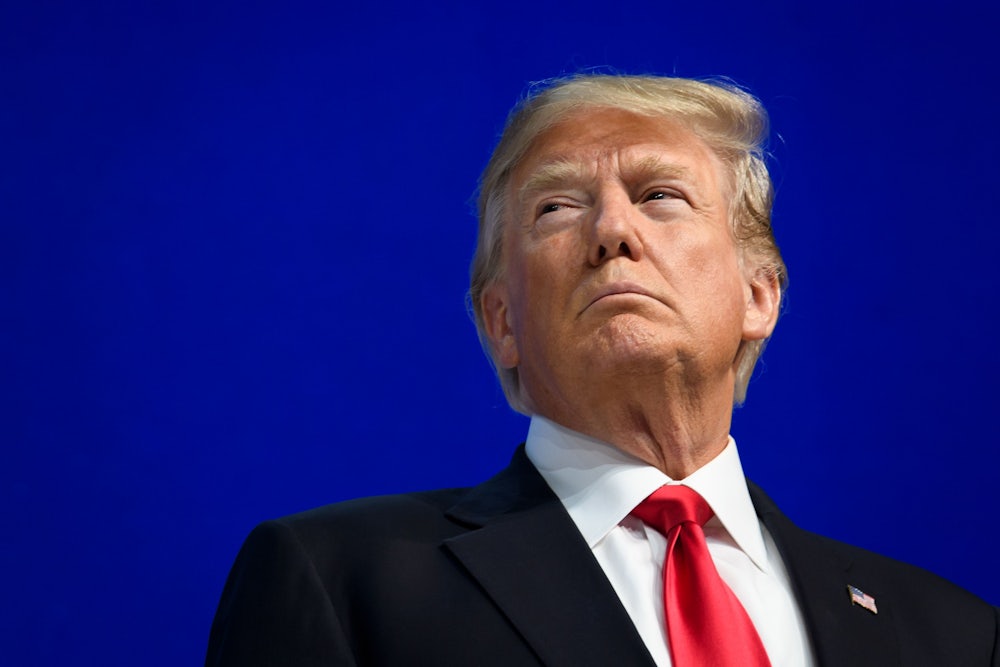While President Donald Trump prepares for his first State of the Union address on Tuesday night, it’s worth taking stock of his progress on a major campaign pledge: wielding the Justice Department’s immense power as a political weapon.
Trump never explicitly said that, of course. But he frequently made his intent clear. On the campaign trail, he often railed against the Justice Department for not prosecuting Hillary Clinton for improperly storing classified information on a private email server. He declared that the department was “a political arm of the White House” and couldn’t be trusted to fairly uncover evidence of Clinton’s presumed guilt. His rally crowds often broke into chants of “lock her up” at the mention of Clinton’s name, and at one point he replied, “I’m starting to agree with you.”
His threats peaked during the second presidential debate, when he told Clinton in person that he would abuse the presidency’s powers to go after her. “I didn’t think I would say this, but I’m going to, and I hate to say it,” he said. “But if I win, I am going to instruct my attorney general to get a special prosecutor to look into your situation.” Clinton responded coolly to the threat. “It’s just awfully good that someone with the temperament of Donald Trump is not in charge of the law in our country,” she told the audience. “Because you’d be in jail,” he shot back.
His rhetoric was more than just aggressive bluster. It provided a window into Trump’s disturbing view of federal law enforcement and his role in it. He ignored the taboo against prosecuting one’s political opponents. He reaffirmed his long-standing disdain for the presumption of innocence and due process. And he positioned himself—not the Justice Department’s career officials, not the FBI, and not the courts—as the arbiter of what is and isn’t criminal behavior.
The presidency hasn’t changed Trump’s mind since he took office. He urged Attorney General Jeff Sessions not to recuse himself from the Russia investigation last March, and when Sessions did step aside, Trump reportedly told aides that he needed an attorney general who could protect him from the Justice Department. He asked then-FBI Director James Comey, who some believe put him in the Oval Office, to publicly clear him of wrongdoing and end an inquiry into former National Security Advisor Michael Flynn; when Comey refused, Trump fired him. He also tried to fire special counsel Robert Mueller, only to back down after White House Counsel Don McGahn threatened to resign instead of carrying out the order.
Trump is fully aware of what he’s doing. “You know, the saddest thing is that because I’m the president of the United States, I am not supposed to be involved with the Justice Department,” Trump said in a radio interview in November. “I am not supposed to be involved with the FBI. I’m not supposed to be doing the kind of things that I would love to be doing. And I’m very frustrated by it.” The next month, he told a New York Times reporter that he has the “absolute right to do what I want to do with the Justice Department.”
This isn’t a uniquely Trumpian idea. During Barack Obama’s presidency, congressional Republicans used high-profile inquiries as a political end unto themselves instead of a means to uncover truth. Sometimes they’ve even been open about it.
In October 2015, House Majority Leader Kevin McCarthy appeared on Sean Hannity’s Fox News show to make his case for succeeding outgoing House Speaker John Boehner. “What you’re going to see is a conservative speaker that takes a conservative Congress that puts a strategy [in place] to fight and win,” McCarthy said. “And let me give you one example. Everybody thought Hillary Clinton was unbeatable, right? But we put together a Benghazi special committee, a select committee. What are her numbers today? Her numbers are dropping. Why? Because she’s untrustable. But no one would have known any of that had happened had we not fought and made that happen.”
In other words, a top GOP leader proudly acknowledged on camera that his party used Congress’s oversight powers to damage a political opponent. McCarthy ultimately paid the price for his honesty by stepping aside from his speakership bid, but the strategy worked. Republicans kept digging until they stumbled across Clinton’s use of a private email server, and then ruthlessly exploited the political damage all the way to the White House.
That strategy continues today, even though Republicans control the entire government. The House Intelligence Committee’s Republican majority voted Monday night to release a classified GOP memo that purportedly alleges Justice Department abuses of the FISA warrant process; to block the release of a Democratic rebuttal memo; and to formally open an investigation into the Justice Department and the FBI. The apparent goal of the memo is to undermine Deputy Attorney General Rod Rosenstein, which could give Trump a pretext to fire him—and thus imperil Mueller’s investigation, which Rosenstein oversees.
Removing Rosenstein or Mueller without good cause would deal a tremendous blow to the American rule of law. But it wouldn’t be shocking or surprising at this point. Destroying the Justice Department’s independence isn’t a distraction from Trump’s policy goals or his campaign pledges. It’s his attempt to fulfill them.
